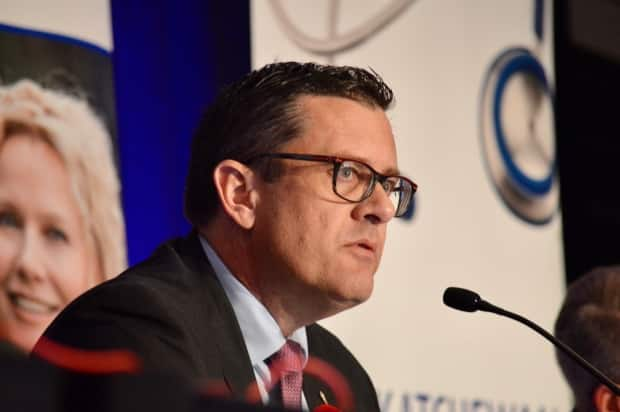Sask. Opposition calls on province to end private-pay MRIs after Ottawa claws back $750k in health funding

Saskatchewan's Official Opposition is calling on the provincial government to stop its private-pay MRI program.
On Friday, Ottawa announced its decision to claw back nearly $750,000 in health transfers to Saskatchewan, due to patients being charged for medically necessary diagnostic imaging services through a private-pay program.
Exchanges between the Opposition NDP and Sask. Party government got heated during question period at the legislature on Monday. The NDP called the private-pay program a "failed for-profit American-style MRI experiment."
Sask. NDP Leader Carla Beck said the province broke the Canada Health Act.
"The Sask. Party knew from day one that they were breaking the law, knew that these cuts were coming, and still didn't do a thing," Beck said.
"Our hospitals are overflowing and the last thing anyone wants to see is even less funding."
But Health Minister Paul Merriman stood by the program.
"We have to leverage every option that we have on the table right now for our health-care system, and that is the private system, both publicly funded, but also private surgeries," Merriman said.
The health minister said 99 per cent of the scan costs are being covered by the provincial government, rather than taxpayers.
The NDP said that since Saskatchewan launched its private-pay MRI program in 2016, wait times for an MRI have not decreased, but have instead increased by 63 per cent.

The Opposition called on the provincial government to immediately stop the private-pay program and commit to strengthening "Canadian-style" public health care in the new budget, set to be released on March 22.
Merriman did not say the private-pay program would stop. In fact, he said it might even be expanded.
Under Saskatchewan's rules, when a private provider completes an MRI or CT scan that is paid for privately, they are required to conduct a second scan free of charge for an individual who is waiting on the public list, according to Merriman.
"No, we won't be changing this policy, Mr. Speaker, because it's on 15,000 scans, Mr. Speaker, that have been paid for by Saskatchewan people, which equals 30,000 scans that have actually been done for our province. This speeds up the process for surgeries, Mr. Speaker. The federal government has should not have done this," said Merriman.
Merriman said an overwhelming majority of Saskatchewan people wanted the private-pay MRI option. NDP health critic Vicki Mowat disagreed.
"Just utter nonsense. He knows that strengthening the public system is an option and is the option in this case, and he's making it out like that it is not an option at all. Shameful. Shameful," Mowat said. "Mr. Speaker, let's be clear about what's going on. The Sask. Party government is breaking the Canada Health Act."
Meanwhile, Merriman said feedback from patients and clinicians has been positive.
Health policy expert concerned about 'market' for scans
Dennis Kendel, a health policy expert and retired physician, said the Sask. government "absolutely" broke the Canada Health Act.
"There's no doubt about it."

Kendel said there are two clinics in Saskatchewan that provide private-pay MRIs — Mayfair Diagnostic, which has clinics in both Saskatoon and Regina, and Open Skies in Regina.
Mayfair discloses their prices online, while Open Skies does not.
"I've seen on Twitter some people declaring that they were among those who paid to get a test and they don't apologize for it. They say, 'as long as I can afford it, it's my right to go ahead and get a test.' I find this quite insensitive to people who do not have those resources," Kendel said.
He said he has heard from families on Twitter who told him they could not afford to pay for an MRI.
"But it involved a child and they were so anxious about delay that they went ahead and paid it."
Kendel said this kind of system is worrisome.
"Really what we need to do is fund enough public capacity to make sure that everybody can get access to this test in that time," said Kendel.
"It doesn't make any sense to under-fund a particular diagnostic procedure and thereby create a market, in essence, for direct pay. That's essentially what they've done. They've underfunded the public sector, and then there is a market, and it gets filled."

